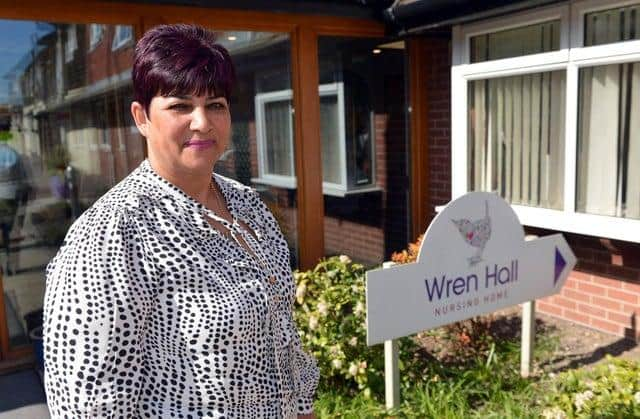Fewer Notts care home workers than before mandatory Covid vaccine announcement
and live on Freeview channel 276
Rules set by the Government last year stated care workers in England needed to have at least one dose of the coronavirus vaccine by September 16 to continue working, and two doses by November 11.
The move was in response to the high number of deaths in the care sector during the pandemic, but was widely criticised, among fears of an ‘exodus’ of care staff.
Advertisement
Hide AdAdvertisement
Hide AdNHS England data shows 8,553 people were working in older adult care homes across Nottinghamshire on January 2 – the most recent date for which figures are available.


This was 257 fewer than the 8,810 recorded on July 18 – days before a 16-week ‘grace period’ for care workers to get their first jab started.
Wren Hall Nursing Home, of Nottingham Road, Selston, is among those to lose staff.
Anita Astle, home owner, said: “Sadly, since March 2021 when the mandating of vaccination was first muted and November 11, when the mandating of vaccination in social care came into force, Wren Hall did lose seven staff.
Advertisement
Hide AdAdvertisement
Hide Ad“This saddens me as even though I support the vaccination initiative, most of these staff had worked through wave one of the pandemic caring for those who were Covid-positive.”
Across England, the number of staff in older adult care homes dropped by 17,000 over the same period.
It is unclear how many workers left as a result of the mandatory vaccine policy.
Recruitment
The Government announced it is relaxing immigration rules to make up for “severe and increasing difficulties” with recruitment and retention in the care sector.
Advertisement
Hide AdAdvertisement
Hide AdIt follows a recommendation from the Migration Advisory Committee that care jobs be made eligible for the health and care visa, designed to help migrants get work visas to fill jobs where there are shortages.
Care providers are experiencing high vacancy rates and turnover, and pressure on staffing is being exacerbated by the spread of the Omicron variant.
Sam Monaghan, chief executive of MHA, the UK’s largest charitable care provider, said: “Essential care and support for older people is facing a staffing crisis the likes of which we have never seen before.
“The changes to immigration rules are a very welcome step forward in addressing the ongoing care staffing crisis.
Advertisement
Hide AdAdvertisement
Hide Ad“However, it will be some months before older people feel the benefit of these much-needed changes.”
The NHS data shows 8,115 workers at older adult care homes in Nottinghamshire had received two Covid jabs by January 2 – 95 per cent of staff employed on that date, and up from 6,645 on July 18.
Across England, 95 per cent of older adult care home workers have received two doses of a Covid jab.
The Department for Health and Social Care said new starters can be deployed to work care homes 21 days after receiving one dose of the vaccine and are required to get a second jab within 10 weeks.
Advertisement
Hide AdAdvertisement
Hide AdOthers not fully vaccinated may consist of those on maternity leave, long term sickness or otherwise not currently deployed, a DHSC spokeswoman added.
They said £462.5 million had been provided for recruitment and retention, and the department was working with the care sector to encourage booster uptake.
